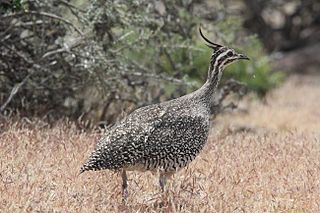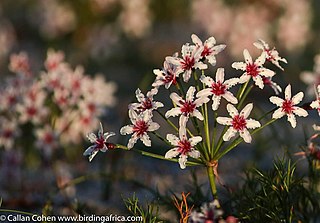
Tinamous are members of the order Tinamiformes, and family Tinamidae, divided into two distinct subfamilies, containing 46 species found in Mexico, Central America, and South America. The word "tinamou" comes from the Galibi term for these birds, tinamu. Tinamous are the only living group of palaeognaths able to fly, and were traditionally regarded as the sister group of the flightless ratites, but recent work places them well within the ratite radiation as most closely related to the extinct moa of New Zealand, implying flightlessness emerged among ratites multiple times. Tinamous first appear in the fossil record in the Miocene epoch. They are generally sedentary, ground-dwelling and, though not flightless, when possible avoid flight in favour of hiding or running away from danger. They are found in a variety of habitats, ranging from semi-arid alpine grasslands to tropical rainforests. The two subfamilies are broadly divided by habitat, with the Nothurinae referred to as steppe or open country tinamous, and the Tinaminae known as forest tinamous.

The black-bellied sandgrouse is a medium large bird in the sandgrouse family.

The diederik cuckoo, formerly dideric cuckoo or didric cuckoo is a member of the cuckoo order of birds, the Cuculiformes, which also includes the roadrunners and the anis.

August von Pelzeln was an Austrian ornithologist. He was a grandson to novelist Karoline Pichler (1769-1843).

The red-winged tinamou is a medium-sized ground-living bird from central and eastern South America. Other common names for the species include perdiz grande, rufous tinamou, and ynambu.

The variegated tinamou a type of tinamou commonly found in moist forest lowlands in subtropical and tropical regions of northern South America.

The painted sandgrouse is a medium large bird in the sandgrouse family Pteroclidae found in India and Pakistan.

Crypturellus is a genus of tinamous containing mostly forest species. However, there are the odd few that are grassland or steppe tinamous. The genus contains 21 species.

The black tinamou is a species of ground bird found in humid foothill and montane forest in the Andes of South America.

The Cape wagtail, also known as Wells's wagtail, is a small insectivorous bird which is widespread in southern Africa. It frequents water's edge, lawns and gardens. It is a mostly resident, territorial species, but has been known to undertake limited altitudinal migration or form flocks outside of the breeding season. Like other wagtails they are passerine birds of the family Motacillidae, which also includes the pipits and longclaws.

The fauna of Colombia is characterized by a high biodiversity, with the highest rate of species by area unit worldwide.
Moghrar is a municipality in Naâma Province, Algeria. It is the district seat the Moghrar District and has a population of 2,796, which gives it 11 seats in the PMA. Its municipal code is 4506
Karl Heinrich Bergius (1790–1818), also known as Carl Heinrich Bergius, was a Prussian botanist, naturalist, cavalryman and pharmacist from Küstrin. He is notable for his natural history collecting in southern Africa.

This article provides a summary of significant events in 1820 in birding and ornithology. Notable occurrences in 1820 include the first description of the yellow-legged tinamou, and the commencement of ornithologist William John Swainson's Zoological Illustrations, a work including illustrations of many birds.
Johannes Ludwig Leopold Mund (1791-1831) and Louis Maire were natural history collectors who worked in the Cape Colony under the sponsorship of the Berlin Museum of Natural History. Museum specimens they collected were always labeled under the names, "Mund & Maire".
Pallas & Poleman were South African pharmacists who played a considerable role in plant collecting in the Cape Colony during the years 1810 to 1839, by employing young German pharmacists such as Bergius, Krebs, Drège and Ecklon.

Christian Heinrich Friedrich Hesse was a Lutheran minister, scholar and naturalist.
This page is based on this
Wikipedia article Text is available under the
CC BY-SA 4.0 license; additional terms may apply.
Images, videos and audio are available under their respective licenses.













